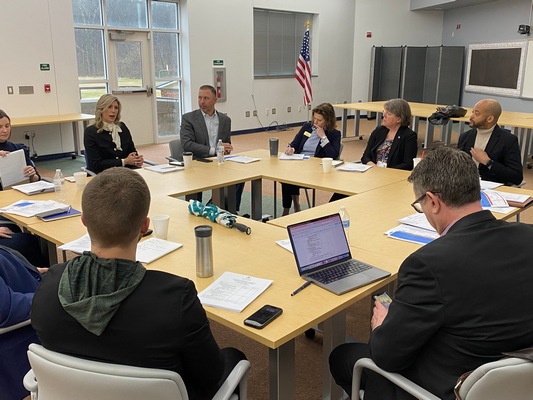Feb. 23, 2024 | by Keith Shearon
Granville County School Board Legislative Committee Chair, Danielle Hayes led today’s meeting between the school board and legislative Representatives Matthew Winslow, Frank Sossamon and Senator Mary Bode. Superintendent Stand Winborne and Hayes highlighted the Board and Administration efforts and drive to make the county public schools a high performance institution, but noted that they have a number of regulated challenges with which the legislators can provide help.
Of primary importance are restrictions on public schools relative to the flexibility provided to the 38 different charter schools competing for Granville County’s more than 8,000 K-12 students. Charter schools have flexibility in operation that the public schools, as presently regulated, cannot compete with on a level playing field.
A primary example of inflexible state law is the competition for experienced teachers that are entering retirement. There has been long-standing political and public opposition to state employees, such as teachers in this case, retiring to a 30-year pension only to be hired back into a vacancy in the school system.
Senator Bode said that such a situation presents a high cost to the state and is therefore forbidden by work rules. Executive Director of Human Resources for Granville public schools, Courtney Currin pointed out that those work rules mean that a retired teacher can only work 29.5 hours per week, preventing them from carrying a full load and full salary, and making it difficult for the public system to use retirees to fill the need for high performing, veteran teachers in the state’s most diverse learning environment.
The board was careful to point out that most of such returning teachers had no such limitation going to a charter school and so the teachers can make quite a bit more going into a charter school during retirement. Senator Bode made the distinction that the reason for this is that those positions were available only from charter schools that had specifically opted out of the North Carolina Teachers pension and insurance plans and were thus able to offer the higher salary.
The real “high cost” or “double dipping” aspect for the state comes down to the difference between entry level pay from the state for a new teacher compared to the highly-trained retiring teacher they replace. That difference could top $20,000 of extra cost for those veteran teachers. The Board and Administration was quick to point out that freshly-minted teachers and a 30-year veteran are not direct comparisons and that the veteran stays in the public school to mentor and bring along new teachers in good practices, making their cost as teaching leaders an irreplaceable good value. The legislators listened and will take the discussion back to Raleigh, but making changes of this sort is likely to be an uphill struggle.
What many residents probably don’t understand on first look is that there are a number of student needs that public schools have had, and quite well adapted to care for over the last several decades. Because charter and private schools often have not installed the expensive infrastructure and support programs of public schools, those alternative schools are often no alternative at all for children with exceptional needs. Those needs might be a learning disability, physical disabilities, and many times boil down to very simple things like transportation to and from school. These needs constitute a burden many poorer families cannot mesh into their daily lives due to costs beyond their means.
The discussion also covered the State funding for exceptional needs which is delivered to the county assuming a flat 12.5% exceptional needs population in every county student body. County needs vary. Granville County Public Schools currently has 14% of its student body needing some sort of support program. So for our county the State reimbursement is insufficient to meet our need requiring the county to make up the difference. This was noted by the Legislators, and Board Chair Glenda Williams added to the discussion that there is a pilot program underway that might change the reimbursement for special needs to pay for “actual needs at cost” rather than a flat reimbursement scheme that doesn’t match many county’s situations.

